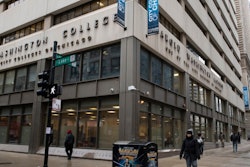Getting In Gear
Community colleges drive the success of the auto industry,
but retention continues to be a problem.
By David Pluviose
In September, Toyota Motor Corp. celebrated the production of its five millionth Camry at its Georgetown, Ky., plant. The Camry has been the top-selling sedan in the United States for four consecutive years and is one of the big reasons Toyota closed the most recent fiscal year with $11.7 billion in net earnings. Camrys began rolling from the Georgetown assembly line in 1988 and have grown in technological sophistication through the years. That evolution has also spawned the need for continuous worker training.
As is usually the case, community colleges were there to fill that need, says Jim White, the director of the Kentucky Community and Technical College System’s Center for Excellence in Automotive Manufacturing. KCTCS has been associated with the auto manufacturing giant since Toyota first set up shop in Georgetown, now its largest U.S. plant.
“We were involved in their skill trades training from the start,” White says. “That relationship is growing dramatically, to the point that we are now setting up and operating a skill trades training program in a facility on their site, but available to the community as well as to Toyota employees.”
The automotive industry has seen its share of negative headlines in recent years. Numerous plant closings and wide-scale overseas outsourcing have hit communities hard, and several companies have been forced to lay off thousands of workers. But despite the grim reports, White says auto manufacturing “as a whole is doing
quite well.
“The fact that the media presents that all these jobs are gone is simply erroneous,” he says. “There are lots of job opportunities for people with the appropriate skills. If people have outdated skills, or no skills, then there’s very little hope.”
Like KCTCS, Virginia’s Tidewater Community College is also responding to the need for qualified automotive technicians.
Ford Motor Co. recently announced plans to close its plant in Norfolk, Va., and TCC’s Toyota, DaimlerChrysler and Honda technician programs could give those employees a chance to get back on their feet.
“Those folks, a lot of them are going to gravitate toward the automotive field, because they feel comfortable there,” says Bud Brueggeman, director of TCC’s automotive technology programs. “If they finish the program, they may be 30 or 35 years old, but they’ll be a Level III, which means they’ll be ‘the doctor in the house.’ They’ll be able to do pretty much anything in the dealership. [Instead of] making $20,000 or $30,000 a year starting pay, they’ll be at a line tech level, which is roughly $43,000-$72,000.”
The ability to improve the lives of students is one of the major motivations for Ricky Cooke, the recruiter for Greenville Technical College’s Nissan/Infiniti Technician Training Program. The money is there to be made. Mid-range auto technicians can command $50,000 a year, while the ceiling for high end techs can reach well over six figures. According to Cooke, Greenville Tech’s program was the result of a partnership between the Greenville, S.C.-based college, Nissan North America and a local dealership. While finding interested students hasn’t been a problem, Cooke says its been a challenge drawing from the region’s fast-growing pool of Hispanic immigrants.
“We do not have any Hispanic students in our program at this point, which I’m disappointed about,” he says. “There were a couple of Hispanic students who have come through who expressed interest, but unfortunately, the problem that we’ve been having is the language barrier.”
Having spent years counseling young African-Americans in New York City, Cooke says he has a particular goal of providing education and economic empowerment opportunities for Black youth. A young Black man washing cars for minimum wage at a rental agency would be one of Cooke’s key targets, he says.
Cooke says much of his recruiting work involves making himself and Greenville Tech visible to any one of a number of Greenville-area Hispanic-oriented organizations. “I try to hook into these organizations, attend various meetings and invite the leaders of these organizations to come here and see what we’re doing,” he says.
White faces a similar challenge in Kentucky, which also has a booming Hispanic population. “We do have relatively low educational attainment by and large and we have a growing immigrant population, so it creates an avenue for people to get into career pathways that are very lucrative,” he says.
At TCC, Brueggeman says his programs are fairly diverse, with a mix of Asian-Americans, Blacks, Hispanics and Whites. But extending opportunities to women continues to be a recruiting struggle.
“We actually have a lot of women in the program this year, and it’s a great place for a woman, for example, with a couple of kids who’s kind of in dire straits and really doesn’t have a lot of [hope] to get the benefits and job she needs,” Brueggeman says. “This would be an ideal place to come, even if she doesn’t want to be a technician, she can be a service writer, service manager or assistant service manager. They work on commission and make good bucks, much more than technicians do.”
Despite the lucrative opportunities opened by the auto manufacturing partnerships, retention continues to be an issue across the board, as adult students often get sidetracked by outside responsibilities. Cooke says his counseling background has enabled him to form the personal relationships with students crucial to helping them stick with these often-challenging programs.
“We have a responsibility for retention once we do get students in here. We don’t just forget about them, we treat them as if we need them,” he says.
On the other side of the country, Washington state’s Shoreline Community College has hit upon one way to keep automotive students moving through the program. Mark Hankins, who heads up the automotive/manufacturing programs at the college, says a requirement that incoming students be sponsored by an auto dealer has been a boon for retention.
“I think over 10 years, we have [about] 60 percent of our students still working at their sponsoring dealership. And that’s pretty good,” he says. “We would like to be more like 80 percent retention, but it was a heck of a lot better than what the dealers were experiencing from people they hired off of the street or from other dealers. When we bring a student into the program, they are required to be employed by a dealership — that’s one of the things that drives a higher quality student, too.”
© Copyright 2005 by DiverseEducation.com















